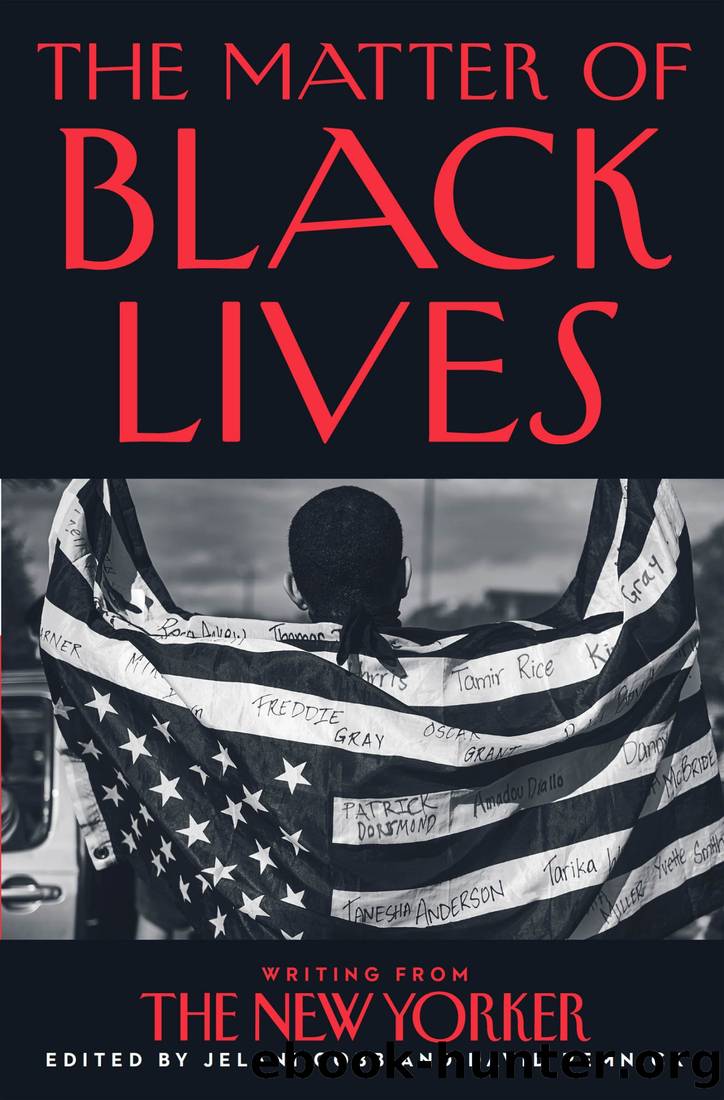The Matter of Black Lives: Writing From the New Yorker by Jelani Cobb & David Remnick

Author:Jelani Cobb & David Remnick [Cobb, Jelani & Remnick, David]
Language: eng
Format: epub
ISBN: 9780008498726
Google: 00woEAAAQBAJ
Publisher: HarperCollins UK
Published: 2021-09-27T23:00:00+00:00
FOR ALL THEIR SIMILARITIES IN BACKGROUND, EDUCATION, SENSIBILITY, even dress (they shared a tailor, Charlie Davidson, himself something of a legend in sartorial circles), the two men inclined toward rather contrasting styles of public presentation. A private man who in later years grew intensely aware of being a public figure, Ellison had contrived a persona designed to defeat white expectations of black brutishness. Hence the same words come up again and again when people try to write about himâwords like âpatrician,â âformal,â âaristocratic,â âmandarin,â âcivilized,â âdignified.â James Baldwin once observed, shrewdly, that Ellison was âas angry as anybody can be and still live.â It was this banked anger that kept his back so straight in public settings, his manners so impeccable; even his spoken sentences wore spats and suspenders. Murray, who enjoyed verbal sparring as much as anybody, lacked that gift of anger, and as a conversationalist he had always taken delight in the saltier idioms of the street. (Imagine Redd Foxx with a graduate degree in literature.) The writer Reynolds Price, a friend of both Ellison and Murray, says, âRalph had a kind of saturnine, slightly bemused quality. I thought Al always seemed the more buoyant person.â
Writing is at once a solitary and a sociable act, and literary relationships are similarly compounded of opposites. So it was with Ellison and Murray, two country cousins. Many people speak of Ellisonâs eightieth-birthday partyâto which Murray had been invited and at which he delivered a moving tribute to his old schoolmateâas a significant moment of reconciliation. âI think it was Ellisonâs way of reaching out to Murray,â a friend of Ellisonâs says.
Then, too, for all his companionability, Murrayâs literary inclinations ran strongly toward the paternal. He takes deep satisfaction in that role, and there are many who can attest to his capacity for nurturance. James Alan McPherson, one of the fiction writers who have most often been likened to Ellison, recalls a time in the late seventies when he was in Rhode Island with Michael Harper, the poet, and Ernest J. Gaines, whose novels include âThe Autobiography of Miss Jane Pittman.â In a moment of mad enthusiasm, they hit on the idea of going to New York and letting Ellison know how much they admired him. When they phoned him, he told them, to their unbounded joy, that they should come right down. And so, after an almost mythic trek, these young black writers arrived at Riverside Drive to pay a visit to their hero.
âMr. Ellison canât see you,â they were told at the door. âHeâs busy working.â
They were crushed. They were also adrift: with the destination of their pilgrimage closed to them, they had no place to go. âSo we called Al Murray, and he picked up the slack,â McPherson recounts. âHe brought us to his apartment, where he had some apples and some bourbon and some fancy French cheese. And he said, âHave you ever met Duke Ellingtonâs sister?â We said no, so he took us over to meet Duke Ellingtonâs sister.
Download
This site does not store any files on its server. We only index and link to content provided by other sites. Please contact the content providers to delete copyright contents if any and email us, we'll remove relevant links or contents immediately.
Kathy Andrews Collection by Kathy Andrews(11812)
The remains of the day by Kazuo Ishiguro(8977)
Spare by Prince Harry The Duke of Sussex(5180)
Paper Towns by Green John(5179)
The Body: A Guide for Occupants by Bill Bryson(5082)
Industrial Automation from Scratch: A hands-on guide to using sensors, actuators, PLCs, HMIs, and SCADA to automate industrial processes by Olushola Akande(5054)
Machine Learning at Scale with H2O by Gregory Keys | David Whiting(4295)
Be in a Treehouse by Pete Nelson(4035)
Never by Ken Follett(3937)
Harry Potter and the Goblet Of Fire by J.K. Rowling(3848)
Goodbye Paradise(3802)
The Remains of the Day by Kazuo Ishiguro(3395)
Into Thin Air by Jon Krakauer(3386)
Fairy Tale by Stephen King(3370)
The Cellar by Natasha Preston(3334)
The Genius of Japanese Carpentry by Azby Brown(3294)
120 Days of Sodom by Marquis de Sade(3262)
Reminders of Him: A Novel by Colleen Hoover(3095)
Drawing Shortcuts: Developing Quick Drawing Skills Using Today's Technology by Leggitt Jim(3075)
